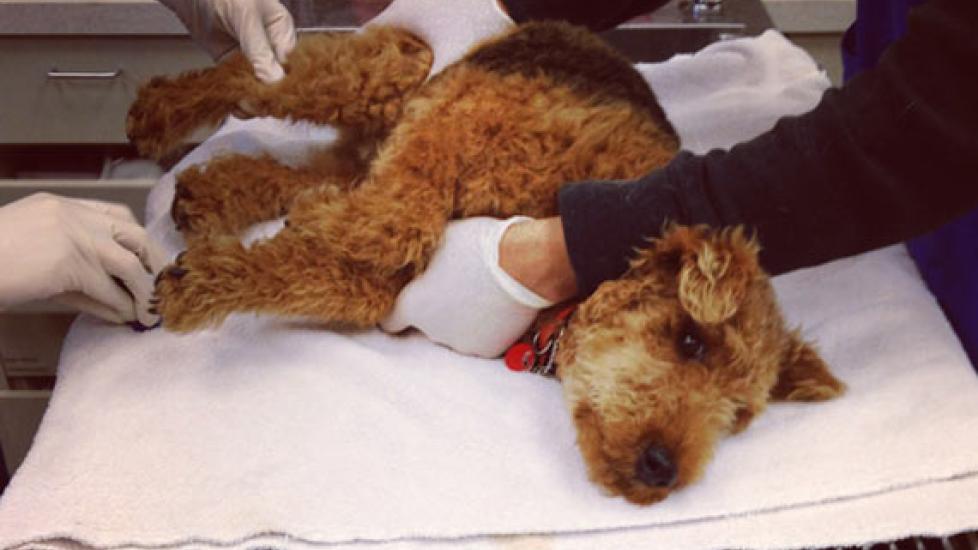When Cancer That Was Successfully Treated Reoccurs in a Dog
If you have previously been a reader of my contributions to petMD’s The Daily Vet, you will remember that I've written extensively about my dog Cardiff’s journey through some commonly fatal illnesses over his 10 years of life.
Cardiff is a neutered, male Welsh Terrier who has overcome great odds to reach his 10 year milestone while maintaining a good quality of life. Considering the cards he’s been dealt by his genetics, there’s never been a time during his illnesses where I feel treatment shouldn’t be pursued as a result of Cardiff’s quality of life being less-than-ideal.
Unfortunately, when Cardiff gets sick, it has been from serious diseases requiring significant surgical or medical intervention to manage. As I write, Cardiff is recovering from a recurrence of cancer. I never take Cardiff’s health for granted, but the illness-free stretches yield less content for me to share with petMD readers. When sickness strikes, I’m more motivated to educate the pet-loving audience about disease recognition, treatment, and prevention.
Before I delve into Cardiff’s current issue, let’s review some of his prior medical issues.
Immune mediated hemolytic anemia (IMHA) — Yes, the pronunciation is challenging. Cardiff has endured four bouts of these typically fatal episodes where his immune system recognizes the red blood cells as foreign, targets them for destruction, and leaves the body anemic (low red blood cell level).
It's a scary process, as despite working with veterinary internal medicine specialists, geneticists, and other experts in the field, we can never pinpoint even one of the underlying factors with the emergence of his disease.
The good news is that I catch Cardiff’s IMHA very early, aggressively treat him with immunosuppressive drugs, replace the lost red blood cells with freshly-transfused counterparts, then wait for his bone marrow to produce more red blood cells while the immunosuppressive drugs are tapered. Fortunately, I’m able to get his overreactive-immune system under control and replace his lost red blood cells before irreversible damage occurs and he quickly feels significantly better.
Cardiff’s most recent IMHA episode occurred in October 2014 after he finished his chemotherapy a few months earlier in July. As he was so heavily immunosuppressed during his chemotherapy, there was no way to predict if Cardiff would again develop IMHA. So, I never started him back on the immunosuppressive drug Azathioprine that he was taking on an every-other-day maintenance plan which seemingly kept his immune system under control. After the October 2014 recurrence, I knew he should always stay on this drug unless he has a more severe immune system issue (like cancer) requiring treatment.
T-Cell Lymphoma — In December 2013 Cardiff was diagnosed with lymphoma, which is a malignant cancer of white blood cells. The immune system relies on a variety of white blood cells to protect the body from invading pathogens (bacteria, virus, fungus, etc.), control inflammation, manage stress, and aid in a variety of other crucial bodily functions. Lymphocytes are a type of white blood cell that, in Cardiff’s case, develope defects in their DNA that cause rapid division with no turn-off switch.
Cardiff’s lymphoma is the terrible kind called T-Cell. B-cell Lymphoma has a better prognosis, while T-cell Lymphoma has a worse prognosis.
After having a focal tumor on a loop of small intestine surgically removed from his abdomen, Cardiff was given 30 days to heal. We then started a course of chemotherapy called the University of Wisconson-Madison Canine Lymphoma Protocol. This approximately six-month protocol involves the administration of a series of oral or injectable medications known as CHOP, which stands for Cyclophosphamide, Hydroxydaunorubicin (Doxorubicin), Oncovin (Vincristine), and Prednisone.
Technically, the surgery to remove the mass and the adjacent small intestinal tissues put Cardiff into remission immediately, as no further cancer cells could be discovered at the time. Yet, as cancer cells that could form tumors might still be present, I elected to treat Cardiff with chemotherapy while striving to support his immune system and whole body health with medications, supplements, herbs, and a whole-food diet. He tolerated his chemotherapy very well with minimal side effects.
Cardiff was cancer free for a full year after finishing his chemotherapy in July 2014. We were even one of the subjects of My Friend: Changing the Journey, a documentary about canine cancer created by the Canine Lymphoma Education Awareness and Research (CLEAR) Foundation. Besides his IMHA recurrence in October 2014, Cardiff had thrived until mid-July 2015.
His clinical signs may not alert most pet owners to the potential for cancer, but I know better considering Cardiff’s extensive history of disease. He began to show decreased appetite, mild lethargy, occasional urgently-produced soft stools containing mucus (large bowel diarrhea or colitis), and episodes of vomiting (active expulsion of stomach contents) or regurgitation (passive expulsion of stomach contents).
Preliminary blood testing was mostly normal but for mild anemia pared with mild loss of protein and albumin (a type of blood protein that helps maintain blood pressure). Such findings are most consistent with digestive tract loss such as that which can occur with an ulcer or some form of moderate to severe stomach or intestinal inflammation.
Supportive care with probiotics (beneficial bacteria), digestive enzymes, antacids, and intestinal soothing supplements and medications yielded some improvements in his clinical signs and blood testing. Unfortunately, some of the signs lingered and Cardiff’ wasn’t bouncing back to his otherwise robust self. When he vomited a large volume of undigested food he had eaten hours before on the 6th day of his illness, I suspected that more serious issues were present.
So, the diagnostic workup with X-rays, ultrasound, and other diagnostics (urine, etc.) began. Check back on August 14th, when I reveal Cardiff’s latest diagnosis and delve into his treatment options.
Cardiff at 10!

Dr. Patrick Mahaney
You can find more Dr. Mahaney and Cardiff at PatrickMahaney.com
Image: Cardiff's chemo treatment, 2014
Related Content
A Veterinarian's Experience with Treating His Dog's Cancer

